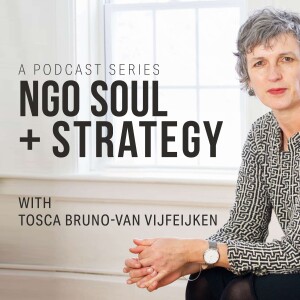
044. Disability rights: how NGOs go about actually claiming them - Susan Sygall @ Mobility International USA
 2022-08-09
2022-08-09
Summary
Why has it taken so long to mainstream disabled people's concerns, when 15% of the global population has some form of disability?
Has it been helpful to see disability integrated into Diversity, Equity, and Inclusion (DEI) approaches -- or have there been some downsides to this approach?
Are there disadvantages to being perceived as a single-issue organization (i.e. disabled people’s organizations)?
Today, I am interviewing Susan Sygall of Mobility International USA (MIUSA) about how NGOs go about claiming rights for people with physical, mental and cognitive disabilities.
Susan’s Bio:
- Co-founder of the Disabled Women's Coalition at the University of California, Berkeley
- Co-founder of the non-profit organization Mobility International USA (MIUSA)
- Winner of the prestigious Henry Viscardi Achievement Awards in 2014 for her work in the disability sector
- Recipient of a prestigious MacArthur Foundation Fellowship in 2000
- Wheelchair rider since the age of 18
We discuss:
- Mobility Int. USA (MIUSA) works on disability rights. It does programming with men and women, though its leadership development program WILD (Women’s Institute on Leadership and Disability) has a special emphasis on women with a disability and their leadership, given these women's ‘double disadvantage’.
- Organizations like MIUSA and others are sometimes indicated as DPOs – Disabled People’s Organizations -- , or OPDs – Organizations for People with Disabilities
- MIUSA’s business model is built, among others, on a consulting offering: MIUSA advises ‘mainstream’ NGOs as well as other international development actors on how to integrate disabled people's approaches into their work
- One of the focal points of MIUSA’s advisory work with non-disability-focused development actors is to make sure that these organizations do not just have policies on paper, but have integrated disability concerns into actual budgets, by adding 2-3% to the budget to allow for disability accommodations and 5-7% for integrating disabled people into program evaluations
- Susan senses that disabled people’s rights finally are getting more fully taken on board; the focus on DEI seems to have helped with this coming to fruition
- If funders request as a standard measure that grant applications indicate how disabled people will be incorporated into the programming, this supports mainstreaming in significant ways
- One of the aspects common to disabled leaders is that in their biographical background, there often were one or more family members who believed in the capacities of the person and supported them wholeheartedly.
Resources:
Mobility International USA website
Profile of Team and Staff at MIUSA
WILD: Women’s Institute on Leadership and Disability
Five Oaks Consulting School's Online course on Virtual Team Leadership skills
Upcoming course dates: September 24 - November 5, 2022
Enroll now to catch the pre-sale discount!
Youtube video of this podcast
Click here to subscribe to&
More Episodes
Create your
podcast in
minutes
- Full-featured podcast site
- Unlimited storage and bandwidth
- Comprehensive podcast stats
- Distribute to Apple Podcasts, Spotify, and more
- Make money with your podcast
It is Free
- Privacy Policy
- Cookie Policy
- Terms of Use
- Consent Preferences
- Copyright © 2015-2024 Podbean.com





